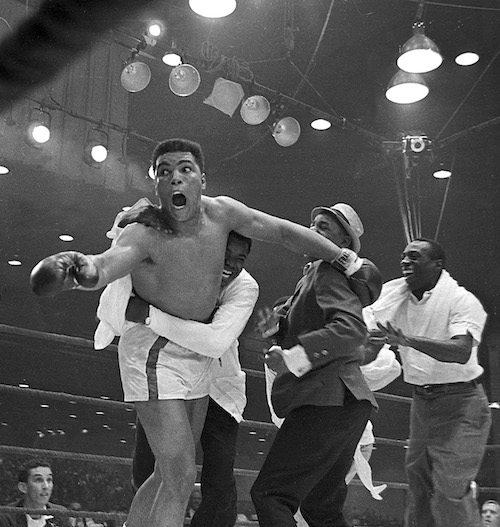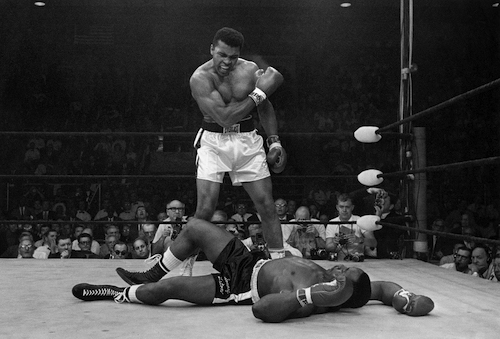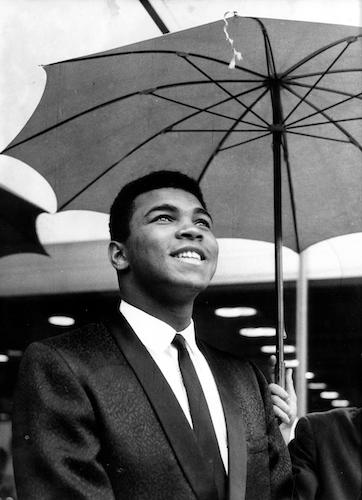Communiqué
Finale: “Round Four: The Spell Remains (1974-2016)” MUHAMMAD ALI From Producer Ken Burns – February 23, at 9 pm
< < Back toMUHAMMAD ALI
Thursday, February 23, 2023 at 9 pm on WOUB
****
Round Four: The Spell Remains (1974-2016)
Muhammad Ali shocks the world by defeating George Foreman, winning back the heavyweight title and becoming the most famous man on earth. After retiring in 1981, he travels the world spreading his Islamic faith, and becomes a symbol of peace and hope.
****
Ken Burns Four-Part Series Explores Life of Legendary Boxer
MUHAMMAD ALI, is a four-part documentary directed by acclaimed filmmaker Ken Burns. The series, which was in development for six years, was also written and co-directed by Sarah Burns and David McMahon, whose previous collaborations with Burns include THE CENTRAL PARK FIVE (2012), JACKIE ROBINSON (2016) and EAST LAKE MEADOWS: A PUBLIC HOUSING STORY (2020).

The film follows the life of one of the most consequential men of the 20th century, a three-time heavyweight boxing champion who captivated billions of fans with his combination of speed, agility and power in the ring, and his charm, wit and outspokenness outside of it. At the height of his fame, Ali challenged Americans’ racial prejudices, religious biases, and notions about what roles celebrities and athletes play in our society, and inspired people all over the world with his message of pride and self-affirmation.
As with all Florentine Films productions, an accomplished group of historians, writers and other topic experts provided input on the script and film, including USC professor of media studies Todd Boyd, author Howard Bryant, Washington University history professor Gerald Early, long-time Burns collaborator and author Geoffrey C. Ward, Rutgers journalism professor Khadijah White, MIT history professor Craig Wilder, and writer David Zirin. Jonathan Eig, a biographer of Ali, was a consulting producer to the film.
Drawing from an extraordinary trove of archival footage and photographs, contemporary music, and the insights and memories of eyewitnesses—including family and friends, journalists, boxers and historians, among others—Burns, Burns and McMahon have created a sweeping portrait of an American icon. The series details the story of the athlete who called himself—and was considered by many to be—”the greatest of all time” and competed in some of the most dramatic and widely viewed sporting events ever, including “The Fight of the Century” and “The Thrilla in Manila,” both against his great rival Joe Frazier, and “The Rumble in the Jungle,” in which he defeated George Foreman to regain the heavyweight title that was stripped from him seven years earlier. MUHAMMAD ALI also captures Ali’s principled resistance to the Vietnam War, his steadfast commitment to his Muslim faith, and his complex relationships with Elijah Muhammad and Malcolm X, who profoundly shaped his life and worldview.

“Muhammad Ali was the very best at what he did,” said Ken Burns. “He was arguably America’s greatest athlete, and his unflinching insistence that he be unabashedly himself at all times made him a beacon for generations of people around the world seeking to express their own humanity.” Burns also explored the life of the first African American heavyweight champion, Jack Johnson, in his 2004 film UNFORGIVABLE BLACKNESS: THE RISE AND FALL OF JACK JOHNSON.
While he is largely celebrated today as an icon of American sport and culture, Ali was not always widely embraced. At times he was reviled by many in American society, especially white Americans and white members of the media, who rejected his faith and feared his involvement with the Nation of Islam. Ali also faced a firestorm of criticism when he said, “I ain’t got nothing against them Viet Cong” and refused induction into the United States Army, citing his religious beliefs—a stance that would result in five years of legal jeopardy and a three-and-a-half-year banishment from boxing.
“Ali is rightly celebrated for his athleticism in the ring,” said Sarah Burns, “but he was equally heroic in his willingness to stand up for what he believed was right.”
“Ali’s principled opposition to the Vietnam War and deeply affecting message of racial pride were remarkable then and equally so now,” said David McMahon. “His actions and words speak to his character and also to his influence as an athlete who used his celebrity to speak out about injustices that he could not tolerate.”

“Muhammad Ali is a national icon whose life and legacy are woven into the fabric of American history,” said Sylvia Bugg, Chief Programming Executive and General Manager, General Audience Programming at PBS. “PBS is committed to sharing stories that deepen understanding and reflect a diversity of perspectives, and we’re thrilled to bring this extraordinary biopic to our audiences this fall.”
Ali’s story is full of contradictions. Despite his competitive reputation and ruthless athleticism in the ring, he went on to become a symbol for peace and pacifism. Though committed to a faith that expected obedience and dignified conduct, he was notoriously unfaithful to his wives, at times publicly flaunting his affairs. Ali was a clever showman with an unparalleled genius for promotion and turn of phrase, who occasionally allowed his partners and friends to take advantage of him. He endlessly trumpeted his own greatness as a boxer, but anonymously donated to save a Jewish old age home, made surprise visits to pediatric hospitals and signed autographs for every last fan.
MUHAMMAD ALI includes interviews with Ali’s daughters Hana Ali and Rasheda Ali, his second wife Khalilah Ali, his third wife Veronica Porche, and his brother and confidant Rahaman Ali. Others appearing in the film include activist and former basketball player Kareem Abdul-Jabbar, boxing promoter Bob Arum, anthropologist Donna Auston, childhood friend Vic Bender, former heavyweight boxing champion and playwright Michael Bentt, author Todd Boyd, sportswriter Howard Bryant, law professor and co-founder of the Weather Underground Bernardine Dohrn, historian Gerald Early, journalist and Ali biographer Jonathan Eig, poet and activist Nikki Giovanni, former heavyweight champion Larry Holmes, childhood friend Alice Houston, sportswriter Jerry Izenberg, civil rights activist Jesse Jackson, professor of religion Sherman Jackson, former Georgia State Senator Leroy Johnson, friend and business manager Gene Kilroy, sportswriter Dave Kindred, boxing promoter Don King, lawyer Tom Krattenmaker, sportswriter Robert Lipsyte, lawyer Michael Meltsner, novelist Walter Mosley, journalist Salim Muwakkil, long-time friend Abdul Rahman, New Yorker editor David Remnick, photographer Lowell Riley, historian Randy Roberts, childhood friend Owen Sitgraves, friend Victor Solano, Nigerian poet and playwright Wole Soyinka, writer Gay Talese, writer Quincy Troupe, and sportswriter Dave Zirin.

